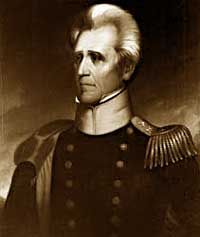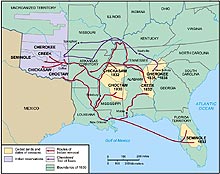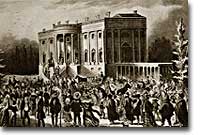23f. Jacksonian Democracy and Modern America

Andrew Jackson rose to national prominance as a General during the War of 1812.
The presidential election of 1828 brought a great victory for Andrew Jackson. Not only did he get almost 70 percent of the votes cast in the electoral college, popular participation in the election soared to an unheard of 60 percent. This more than doubled the turnout in 1824; Jackson clearly headed a sweeping political movement. His central message remained largely the same from the previous election, but had grown in intensity. Jackson warned that the nation had been corrupted by "special privilege," characterized especially by the policies of the Second Bank of the United States. The proper road to reform, according to Jackson, lay in an absolute acceptance of majority rule as expressed through the democratic process. Beyond these general principles, however, Jackson's campaign was notably vague about specific policies. Instead, it stressed Jackson's life story as a man who had risen from modest origins to become a successful Tennessee planter. Jackson's claim to distinction lay in a military career that included service as a young man in the Revolutionary War, several anti-Indian campaigns, and, of course, his crowning moment in the Battle of New Orleans at the end of the War of 1812.
Jackson's election marked a new direction in American politics. He was the first westerner elected president, indeed, the first president from a state other than Virginia or Massachusetts. He boldly proclaimed himself to be the "champion of the common man" and believed that their interests were ignored by the aggressive national economic plans of Clay and Adams. More than this, however, when Martin Van Buren followed Jackson as president, it indicated that the Jacksonian movement had long-term significance that would outlast his own charismatic leadership.

Andrew Jackson is known to have harbored animosity for Native Americans. During his administration, many tribes were moved to reservations in the Oklahoma Territory.
Van Buren, perhaps even more than Jackson, helped to create the new Democratic party that centered upon three chief qualities closely linked to Jacksonian Democracy. First, it declared itself to be the party of ordinary farmers and workers. Second, it opposed the special privileges of economic elites. Third, to offer affordable western land to ordinary white Americans, Indians needed to be forced further westward. The Whig party soon arose to challenge the Democrats with a different policy platform and vision for the nation. Whigs' favored active government support for economic improvement as the best route to sustained prosperity. Thus, the Whig-Democrat political contest was in large part a disagreement about the early Industrial Revolution. Whigs defended economic development's broad benefits, while Democrats stressed the new forms of dependence that it created. The fiercely partisan campaigns waged between these parties lasted into the 1850s and are known as the Second Party System, an assuredly modern framework of political competition that reached ordinary voters as never before with both sides organizing tirelessly to carry their message directly to the American people.

A "mob" descended upon Andrew Jackson at the White House to celebrate his victory in the election of 1828. Public parties were regular occurrences during Jackson's administration.
A new era of American politics began with Jackson's election in 1828, but it also completed a grand social experiment begun by the American Revolution. Although the Founding Fathers would have been astounded by the new shape of the nation during Jackson's presidency, just as Jackson himself had served in the American Revolution, its values helped form his sense of the world. The ideals of the Revolution had, of course, been altered by the new conditions of the early nineteenth century and would continue to be reworked over time. Economic, religious, and geographic changes had all reshaped the nation in fundamental ways and pointed toward still greater opportunities and pitfalls in the future. Nevertheless, Jacksonian Democracy represented a provocative blending of the best and worst qualities of American society. On the one hand it was an authentic democratic movement that contained a principled egalitarian thrust, but this powerful social critique was always cast for the benefit of white men. This tragic mix of egalitarianism, masculine privilege, and racial prejudice remains a central quality of American life and to explore their relationship in the past may help suggest ways of overcoming their haunting limitations in the future.








